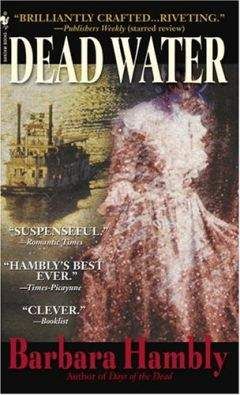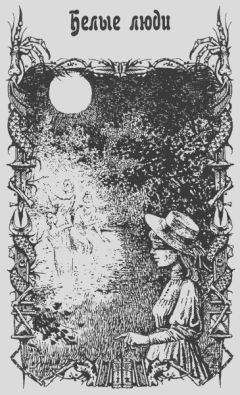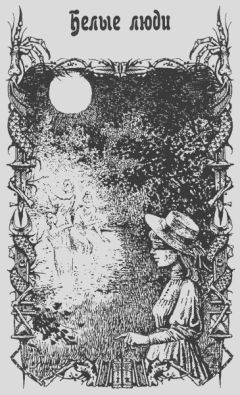Barbara Hambly - Dead water
На сайте mybooks.club вы можете бесплатно читать книги онлайн без регистрации, включая Barbara Hambly - Dead water. Жанр: Прочее издательство неизвестно,. Доступна полная версия книги с кратким содержанием для предварительного ознакомления, аннотацией (предисловием), рецензиями от других читателей и их экспертным мнением.
Кроме того, на сайте mybooks.club вы найдете множество новинок, которые стоит прочитать.

Barbara Hambly - Dead water краткое содержание
Dead water читать онлайн бесплатно
Undoubtedly with Jubal Cain's four hundred blackmailed dollars—with enough left over for lunch.
“You'll see it when the sheriff gets here,” said Rees as they vanished inside, confirming January's guess. January himself, he was well aware, was only an adjunct to the whole process—merely stolen property to be secured until those who were legally human determined guilt or innocence.
So he had to force himself silent as he was walked across the yard, past the man chained at the whipping-post, to the door of the slave-jail. Tom keyed open the padlock. Trapped heat, a cloud of flies, and the stench of a latrine-bucket rolled out like the breath of Hell.
The padlock clunked against the wood of the door as the bolt was secured again behind him.
A man got to his feet in the corner, held out his hand. “I'm Bobby,” he said in the just-broken voice of a youth.
“Ben,” January introduced himself.
Outside came the heavy crack of a whip, and a man's stifled sob of pain. Bobby flinched, too. In the fragments of daylight that seeped through the brick-holes up under the eaves, his face was downy with the first beard of adolescence. “They charges fifty cents a stroke,” provided Bobby, trying to sound casual about it. “They whipped a woman this mornin' an' all the men over in the jail back of the courthouse crowded up to the window to watch. You a house-nigger?” He was looking with respectful shyness at January's clean linen and well-cut jacket.
“Manservant,” replied January.
“You run away?”
January shook his head, and pressed his eye to the Judas in the door. “That damn deputy Rees arrested both me and my master, on a lie.”
“Somebody paid him.” Bobby flinched again at the next whip-crack, the next gasping scream. “That Rees'd arrest his own mama, somebody pay him. Least that's what Cuth said.” The young man's eyes moved to indicate the man outside at the whipping-post. “He from town here, belong to Marse Simms the blacksmith. Marse Simms say he was stealin', but it's really Young Marse that's takin' iron an' nails an' that an' sellin' 'em, Cuth says. I coulda told him ain't no good to say so.”
He shivered a little at the sound of a more desperate cry. “I runned away,” he added softly.
Silence outside, then a man's truculent voice: “All right, then, Cuth. You gonna be a good darky now?”
Whatever Cuth said, it was too muffled to hear, but a moment later there was the clank of chain against wood, the crunch of boots on gravel. The soft thunk of the closing station-house door.
Flies, wasps, and bees roared in circles in the blue-brown shadows of the slave-jail's rafters. Far off in the silence January heard a cannon fire, announcing another steamboat coming into the landing.
A few hours, Rose had guessed. Long enough for Mr. Roberson and his family to have luncheon with some friend in Natchez-Over, for Colonel Davis to pay a social call, for half the crew to get robbed and stripped in Natchez-Under. . . .
Had Weems's promise to return at two been based on information La Pécheresse had gleaned from Ladies' Parlor gossip? Was two when the Silver Moon would be steaming away upstream, to leave Hannibal and January stranded in the Natchez jail until Sheriff Gridley finally let them out for lack of evidence?
I'll leave you reports at General Delivery, left till called for, in Vicksburg, Mayersville, and Greenville, and I'll wait for you at the best free colored boardinghouse in Memphis, Rose had said as calmly as if she'd been making arrangements to meet him at his mother's house after Mass. I'm not sure I'll be able to pursue them beyond Memphis alone. . . .
And if she wasn't in Memphis when he got there? Dear God, how would he ever find her, with the whole length of the river to search? With scoundrels like Gleet and Cain on the boat, eyeing every man and woman of color with cold calculation, resenting the freedom that took seven to fourteen hundred dollars out of his, Gleet's, pocket . . . ?
Despite the oven-like heat of the brick jail, January felt cold through to his marrow.
Blessed Virgin, he prayed, sliding his hand into his jacket pocket to touch the blue glass beads of his rosary, take care of her. Watch over her.
In his mind he pictured the serene face of the Mother of God as he'd seen it on the statues in the cathedrals here and in Paris . . . as he sometimes saw it in his dreams. That star-crowned woman in the sky-blue veil, smiling as she watched over the world.
Get me the hell out of here. . . .
The key rattled in the padlock. January and the boy Bobby turned, startled—January noting that whoever had crossed the graveled yard must have done so with conscious silence. A young man who looked like a slave janitor stood in the doorway with a pitcher of water: “I brung this for you,” he informed them unnecessarily, and set it down. He closed the door, and January heard his bare feet on the gravel this time, but very soft, and very swift, before silence closed in again.
January bent to pick up the pitcher, then stopped. “I don't think that man bolted the door.”
“You shittin' me,” said Bobby.
January pushed the door.
It opened.
The trunks will still be at the hotel.
I can at least warn Rose.
This is a trap, isn't it?
January caught Bobby's arm as the young man started to rush past him into the sunlit yard. People did do stupid things, of course. Careless oversights that would get them a whipping from Deputy Rees and Tom.
But his every nerve and muscle prickled with watchfulness as he and Bobby slipped through the door, hastened across the yard and out the narrow gate to Commerce Street. . . .
“This way, boys!” A tall man in a shabby black coat was waiting for them at the corner of the alley. Rusty braids hung Indian-fashion down to his shoulders, and a faded black patch covered one eye; the other was blue and sharp under a curling fringe of brow. As he caught each of them by the sleeve, to draw them through a side-door into the shed behind an apothecary shop, January saw he wore a clerical collar.
“Thank God you had the sense to run,” whispered the preacher. “There's men so cowed by fear they won't even take the blessing of freedom when the prison door swings wide!”
“Who are you?” asked Bobby in the same tone the Patriarch Abraham must have addressed the angels who came calling at his tent.
“Reverend Levi Christmas.” The man shook Bobby's hand, then January's. “Of the Underground Railway.”
Even in New Orleans, January had heard of what was beginning to be called the Underground Railway. In the copies of the Liberator that Mr. Quince had slid beneath the stateroom door he had read a good deal more. It was a loose organization of Abolitionists, Quakers, and some free blacks who worked together to smuggle runaway slaves to freedom in Canada. They passed the fugitives from one household to another, hiding them in barns and false attics and under the raised bottoms of specially-made boats and wagon-boxes, guiding them by night, sometimes hiding them for weeks at a time until chance offered an opportunity for them to slip across the river to Ohio.
Senators like John Calhoun of South Carolina stormed about the responsibility of the United States Government to protect slave-holders' property, and Democratic newspapers denounced the organizers of the Railway as fomenters of slave insurrection and heirs to Nat Turner's bloody schemes. But no politician really dared to go near, or think about—or talk about—the whispers that were rising everywhere in the nation.
“Here.” From a sack in the shed's corner Christmas pulled a couple of slouch hats and two ragged jackets. “Put these on, and follow me. We can keep you hid down Under-The-Hill till the time comes to pass you along.”
Bobby snatched the garments eagerly, but January drew a deep breath and stepped back. “You're going to think me insane, sir,” he said. “And poor-spirited, too. But I cannot forsake my master, who was arrested with me on a false charge. He's not a well man,” he added, seeing Bobby's stunned astonishment at this repudiation of every field-hand's dream. “He needs me.”
An easier explanation, he reflected, than the truth.
The Reverend's single blue eye widened in surprise, then narrowed again. “You think your loyalty is going to remain in his mind the next time he needs a thousand dollars and has nothing to sell but you?” he asked. “You think his family are going to remember your loyalty when he dies, and leaves you to a nephew or a cousin, like an outworn hat? God will look after your master, as He looks after us all, son.”
“You crazy, man!” added Bobby. “You can't trust them from one minute to the next!”
January shook his head. “I'm sorry,” he said. “I can't abandon him.”
The Reverend raised his eyebrows, making the eye-patch bob. “Son, having escaped from the jail, I don't think you understand what will wait for you in this town as a fugitive slave. They don't take kindly to runaways hereabouts.”
“They whip the tar outa you, do they catch you again!”
“I'll be careful.” January took up the empty sack from the floor to hold his jacket and top-hat. It's not even noon yet, he thought, glancing at the angle of the hot yellow splinters of light that fell through the shed's cracks. The Silver Moon can't be leaving this soon. . . .
Christmas sighed. “You're a braver man than I, son.” He held out his hand, callused and hard in January's answering grip, a workingman's hand. No milk-fed seminarian, this one, January thought: here was one of the few people January had encountered who looked like he could actually take on Jubal Cain and maybe win. “But loyalty is one of God's hall-marks, and I'm not going to argue with it, even if I think it's misguided. My only request is that you mention this to no one, not even your master . . . no one. It's astonishing how information spreads along the river, and you know that we of the Underground Railway operate at the risk of our lives.”
This was true, January knew. The slave uprisings of Nat Turner and Denmark Vesey were still fresh in the minds of those who saw black faces outnumber white wherever they turned. There were many in the slave states—and in the North as well—who regarded both the Underground Railway and the Abolitionist movement as encouragement and assistance to another slave uprising. Already there had been instances of retaliatory violence and murder.
“I'll be silent, sir.” January pressed that callused hand again. “You go with God.”
“And you, sir.”
“You, too, Bobby.”
And the young man flashed him a shy grin. “He must be one good master. But I still think you crazy.”
“You change your mind, son,” added Christmas, “you come down to the Stump. It's a tavern at the end of Silver Street, under the hill. They know me there—and they know how to keep their mouths shut.”
January glanced through the shed door to make sure the coast was clear, then stepped out into the hot, hushed morning sunlight. As he crossed the street to make his casual and hopefully inconspicuous way back to the Imperial Hotel, he glanced back. He saw Christmas and Bobby step out and stroll away toward the road that led back down under the hill. Bobby followed behind, like a respectful servant should—the way January was careful to follow behind Hannibal. He prayed the boy would get to safety.
Nobody molested him on his way back to the hotel. Even in the shabby jacket he'd gotten from Christmas he was sufficiently respectable-looking not to cause comment, and there were plenty of other black men, slaves or free, on the streets. At least, he reflected, Weems and Fischer would be well and truly gone from the hotel by this time. He tried not to hurry his steps, but he wondered what he would do if the trunks had been taken inside already. Try to talk his way in as Mr. Weems's manservant? An employee of the steamboat company would be a better ruse. An irregularity, a mix-up of trunk lables, We have to make sure this isn't Mrs. Johnson's that was taken off by mistake. . . . Would they believe that? I just need a quick look inside; Mrs. Johnson's given us a list of the things that should be there. . . .
Then at least he could get word back to Rose about how things stood, and see how much time he had before the boat left. Surely they wouldn't leave with such respectable gentlemen as Roberson and Davis ashore having a visit with friends and family.
January turned down the side-street to the Imperial's rear yard just as a dray emerged from the gate, driven by a couple of sulky bearded men in slouched hats. As January passed it, wondering if he could manage to pick the locks on the trunk if he did find them still in the yard and unobserved, he saw, under the canvas covering thrown over the dray's load, the glint of brass trunk-corners and the dull greenish leather that was instantly recognizable.
Heading back for the boat, he thought sourly. So the whole thing was a ruse after all, designed to smoke out pursuers. Designed, in fact, to stop us here, to lure us ashore where we could be dealt with. . . .
But in that case, why pay to have bogus chests taken back on board?
Or are they going elsewhere? To some house or receiving-office in Natchez? Did Weems and Fischer actually intend to stay for a time, until they recognized Hannibal?
January trailed the cart down Silver Street, and into the criss-crossed mangle of alleyways that spread along the feet of the bluff. Due to the lowness of the river the streets were fairly firm, but in high water at least a quarter of the buildings, to judge by the height of the stilts on which they stood, must flood. Crazy lines of duckboards zig-zagged among the sheds and shacks, and rude stairways ascended walls or rises of the ground. Mosquitoes hummed everywhere under the shadows of the houses, where weeds grew rank in standing puddles.
The dray was definitely not going back to the boat.
January recalled Mrs. Fischer's sharply intelligent dark glance, and the cool command in her voice. You're not touching a dime. . . .
He could easily imagine her as at home in Natchez-Under as she was in the Ladies' Parlor, sympathizing with Mrs. Tredgold about the proper methods of disciplining children.
He hung back as far as he could behind the dray, and thanked God that the blistering heat seemed to be keeping most of the troublemakers indoors. A couple of the black whores, and one who might have been Cuban or Mexican, called out to him from their windows, but he only smiled and waved and shook his head, and tried to look as unobtrusive as possible. Toward the end of Silver Street the ground grew sodden: here the river had cut in behind the last of the buildings and the ground sloped down to a sticky morass of dessicated gray weeds and puddles teeming with crawfish and gnats. On the edge of this slough, the buildings all stood on stilts, and the farthest out—whose rickety gallery was occupied by half a dozen drinkers spitting tobacco down into the water—was reached by a crazy plank gangway that stretched from its door to terra firma. Beneath it the shore currents surged sluggishly around the pilings that held it up, and little drifts of leaves, tree-branches, and what looked like the dead body of a British sailor snagged up against them, to provide footing for legions of rats.
Похожие книги на "Dead water", Barbara Hambly
Barbara Hambly читать все книги автора по порядку
Barbara Hambly - все книги автора в одном месте читать по порядку полные версии на сайте онлайн библиотеки mybooks.club.




